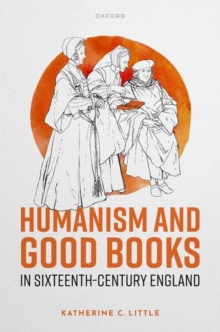Description
| Product ID: | 9780192883193 |
| Product Form: | Hardback |
| Country of Manufacture: | GB |
| Title: | Humanism and Good Books in Sixteenth-Century England |
| Authors: | Author: Katherine C. Little |
| Page Count: | 240 |
| Subjects: | Literary studies: general, Literary studies: general, Literary studies: ancient, classical and medieval, Literary studies: poetry and poets, Literary studies: fiction, novelists and prose writers, Ethics and moral philosophy, Literary studies: classical, early & medieval, Literary studies: poetry & poets, Literary studies: fiction, novelists & prose writers, Ethics & moral philosophy |
| Description: | Explores the mindset in which people approached reading and writing in the sixteenth century, specifically the idea that reading books was 'good' for you in the sense that it was morally useful and informative. This book explores sixteenth-century humanism as an origin for the idea of literature as good, even great, books. It argues that humanists located the value of books not only in the goodness of their writing-their eloquence--but also in their capacity to shape readers in good and bad behavior, thoughts, and feelings, in other words, in their morality. To approach humanism in this way, by attending to its moral interests, is to provide a new perspective on periodization, the transition from the Middle Ages to the Renaissance / early modern. That is, humanists did not so much rupture with medieval ideas about literature or with medieval models as they adapted and altered them, offering a new confidence about an old idea: the moral instructiveness of pagan, classical texts for Christian readers. This revaluation of literature was a double-edged sword. On the one hand, humanist confidence inspired authors to invent their own good books--good in style and morals--in morality plays such as Everyman and the Christian Terence tradition and in educational treatises such as Sir Thomas Elyot''s Boke of the Governour. On the other hand, humanism placed a new burden on authors, requiring their work to teach and delight. In the wake of humanism, authors struggled to articulate the value of their work for readers, returning to a pre-humanist path that they associated with Geoffrey Chaucer. This medieval-inflected doubt pervades the late sixteenth-century writings of the most prolific and influential Elizabethans-Robert Greene, George Gascoigne, and Edmund Spenser. |
| Imprint Name: | Oxford University Press |
| Publisher Name: | Oxford University Press |
| Country of Publication: | GB |
| Publishing Date: | 2023-03-16 |
